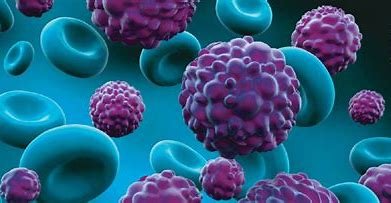Propanc Biopharma Concludes PRP Could Become an Effective Chemosensitizer Agent Against Pancreatic Cancer
02 December 2022 | Friday | News

Image Source : Public Domain
Propanc Biopharma, Inc. (OTC Pink: PPCB) (“Propanc” or the “Company”), a biopharmaceutical company developing novel cancer treatments for patients suffering from recurring and metastatic cancer, today announced that Chief Scientific Officer and Co-Founder, Dr. Julian Kenyon MD, MB, ChB, has recently come to the conclusion that PRP could become an effective chemosensitizer agent against pancreatic cancer. Chemotherapy activates certain growth factors, which directly activate cancer-associated fibroblasts (CAFs) to induce collagen deposits in pancreatic ductal adenocarcinoma, thus increasing tumor resistance and becoming unresponsive to treatment, according to Kim, et al., Nature Communications, journal, October 22, 2022. Pancreatic adenocarcinoma (PDAC) accounts for 80% of pancreatic cancers and has a 5-year survival rate of less than 8%. According to Dr. Kenyon, chemotherapy-induced fibrosis in PDAC highlights an “opportunity for a combinatorial therapeutic strategy to treat these resistant tumors.”
Cancer-associated fibroblasts (CAFs) are one of the abundant cell types in the external fibrous walls of tumors, which is the major source of the extracellular matrix within the tumor microenvironment (TME). Emerging evidence indicates that the dense collagen matrix increases resistance to standard anti-PDAC therapies. Furthermore, activated CAFs stimulate cellular signals that promote tumor growth through angiogenesis (blood vessel formation) and immunosuppression. As a result, various therapeutic targets have been identified to support CAF activation, reduce tumor resistance, and improve patient prognosis. Despite extensive efforts, none of these attempts has received FDA approval for the treatment of PDAC due to limited efficacy. One reason for the frustrating outcome could be due to the genetic variability of the CAF population within the TME, making genetic sequencing and targeting difficult. Therefore, the key is to target genetic variations which are less subject to mutation. Another option is to enforce CAFs to express different cellular signaling pathways, which re-educates the cell instead of targeting eradication, leading to decreasing the influence of the TME in drug uptake, immune evasion, tumor progression and further tumor dispersion.
“PDAC resistance to standard chemotherapy remains a significant challenge and consequently results in a poor prognosis for sufferers. Recent attempts to address this effect have focused on the inhibition of CAFs to prevent formation of fibrotic tissue, which contributes to tumor resistance, but with limited results due to genetic variability among patients,” said Dr. Kenyon. “This is where PRP comes in. We recently confirmed PRP’s effects on the tumor microenvironment and its ability to alter the expression of CAFs and limit its ability to increase tumor resistance. PRP is a unique approach because, rather than target the genetic sequence to inhibit cellular signaling pathways, it re-educates these cells to overcome tumor resistance. This could have tremendous implications for PRP as a chemosensitizer agent with standard therapies to generate better clinical outcomes for PDAC patients. We look forward to providing further scientific data as we continue our joint research program with our partners at the Universities of Jaén and Granada in Spain.”
PRP is a mixture of two proenzymes, trypsinogen and chymotrypsinogen from bovine pancreas, administered by intravenous injection. A synergistic ratio of 1:6 inhibits growth of most tumor cells. Examples include kidney, ovarian, breast, brain, prostate, colorectal, lung, liver, uterine, and skin cancers.
Most Read
- Innovations In Magnetic Resonance Imaging Introduced By United Imaging
- Management of Relapsed/Refractory Multiple Myeloma
- 2025 Drug Approvals, Decoded: What Every Biopharma Leader Needs to Know
- BioPharma Manufacturing Resilience: Lessons From Capacity Expansion and Supply Chain Resets from 2025
- APAC Biopharma Review 2025: Innovation, Investment, and Influence on the Global Stage
- Top 25 Biotech Innovations Redefining Health And Planet In 2025
- How Health Systems Are Reshaping Drug Adoption, Partner Models, and Market Access in 2026
- The New AI Gold Rush: Western Pharma’s Billion-Dollar Bet on Chinese Biotech
- Single-Use Systems Are Rewiring Biopharma Manufacturing
- The State of Biotech and Life Science Jobs in Asia Pacific – 2025
- Asia-Pacific Leads the Charge: Latest Global BioSupplier Technologies of 2025
- Invisible Threats, Visible Risks: How the Nitrosamine Crisis Reshaped Asia’s Pharmaceutical Quality Landscape
Bio Jobs
- The State of Biotech and Life Science Jobs in Asia Pacific – 2025
- Avantor’s New CEO Ligner Aims to Unlock Global Potential and Deliver Shareholder Value
- AstraZeneca Commits $50 Billion to U.S. Expansion by 2030 in Biggest-Ever Global Investment
- Thermo Fisher, SAMRC, and South Africa’s Department of Science and Innovation Launch CATIR to Nurture Next-Gen Scientists
- Cube Biotech Appoints Former Sartorius CEO Dr. Joachim Kreuzburg to Board of Directors
- FDA’s AI Transition Marks a Turning Point in Drug Review: Industry Faces Pressure to Adapt Amid 20% Workforce Cut
- WuXi XDC Completes Mechanical Build of Singapore Bioconjugate Manufacturing Hub
News
Editor Picks











